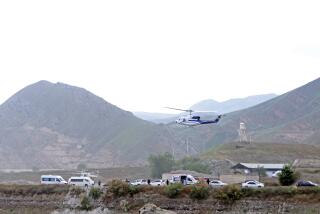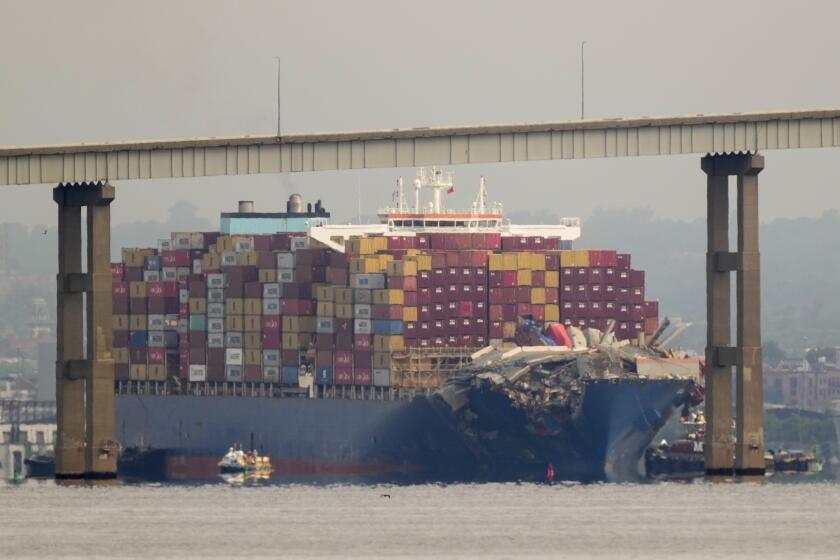U.S. and Allies Tighten Noose on Illegal Oil Shipments Through Gulf
ABOARD A NAVY PLANE OVER THE STRAIT OF HORMUZ -- As the Bush administration considers a military strike against Iraq, the U.S. and its coalition partners have stepped up pressure on Saddam Hussein’s regime by blocking the flow of illegal Iraqi oil through the Persian Gulf.
The U.S. Navy and those of other nations have attempted for a decade to enforce a United Nations order limiting Iraqi oil shipments. But that effort has been significantly bolstered in recent months with additional planes and ships and a newly aggressive attitude.
Navy P-3 Orion surveillance planes track hundreds of vessels in the Gulf, looking for oil smugglers. Suspect vessels are watched and sometimes boarded at gunpoint by sailors from U.S., British and Australian warships.
At the same time, the Orions watch for terrorists who might be tempted to strike a military or commercial ship, particularly at the Strait of Hormuz, where the Gulf squeezes down to a 40-mile-wide funnel between Oman and Iran.
“Our job is to stop the bad guys from doing bad things and make sure the good guys can navigate freely,” Lt. Cmdr. Gilbert Hageman said recently as his Orion patrolled at more than 20,000 feet.
Crew members on the aging P-3s joke that they are the Highway Patrol of the Persian Gulf, pulling over bad drivers and protecting good ones. The path used by tankers attempting to smuggle oil the roughly 900 miles from Iraq to the open sea is known as the Smugglers Superhighway.
The effectiveness of the stepped-up interdiction effort is unclear.
U.S. Navy statistics show that, compared with a year ago, more than twice as many potential smugglers are being tracked and five times as many are being turned back. Vessels that lack a letter authorizing their shipment under the United Nations’ “oil for food” program, which allows the Iraqi government to raise money for humanitarian purposes by selling oil, are turned back to port. By Navy figures, nearly 43,000 tons of oil was turned back in September.
But there are also indications that Iraq is managing to smuggle more oil to market through overland routes, particularly with the aid of Syria. Analysts also note that economic pressure has rarely worked to force Hussein to moderate his ways.
“Maybe it’s not a knockout punch,” a Western diplomat said of the interdiction effort, “but it’s a nice jab to his face.”
The program consists of at least three phases.
First is a screen of ships near the Iraqi access in the northern reach of the Gulf. A team of U.S., British and Australian warships led by an Australian commodore is backed by Orions peering down from above.
If suspected ships slip past that screen, the Strait of Hormuz allows a second opportunity. The navigable channel is only a few miles wide, and the Orions have photographic technology that can detect a sailor swabbing a deck.
“We’re not the action heroes, but we’re helping out in the long run,” said aviation warfare systems operator Tammy Gonzalez, 24, of Hillsboro, Ore. “We’re not focused on, ‘Oh my God, we may go to war with Iraq.’ We’re just doing our job every day.”
Electronics technician David Winther, 34, a 17-year veteran from Fond du Lac, Wis., said the daily cat-and-mouse game with oil smugglers reminds him of the Cold War, when the Orions hunted for Soviet submarines.
“When the [Berlin] Wall went down and the Soviets went bankrupt, it got boring for a while,” he said. “Now with the advent of this, it’s a lot more exciting again.”
The Screaming Eagles squadron, based on Whidbey Island in Washington state, is capable of keeping at least one plane in the air 24 hours a day so that nightfall does not provide safe haven for smugglers or terrorists.
“The traditional role of the U.S. Navy is to keep sea lanes open,” said Hageman, 33, of Birmingham, Ala. “It just so happens this one is at the choke point of the world’s economy.”
If smugglers get past the Strait of Hormuz, a rotating task force of Canadian, Dutch, U.S., Italian, Australian, German, French, British and Spanish planes and ships awaits in the Gulf of Oman to give chase.
Although there may have been bickering at the U.N. about how to respond to Hussein, naval forces in the region appear to be working in tandem.
More to Read
Start your day right
Sign up for Essential California for news, features and recommendations from the L.A. Times and beyond in your inbox six days a week.
You may occasionally receive promotional content from the Los Angeles Times.






